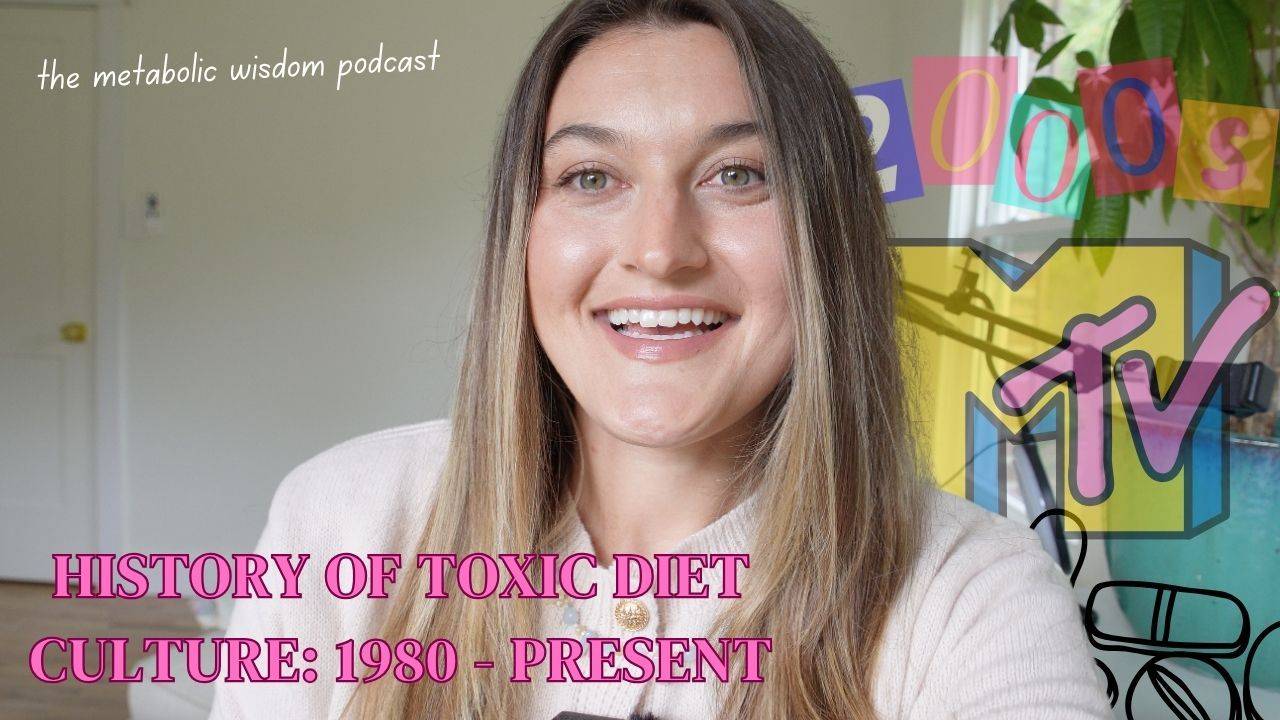Folic Acid, Folate, and MTHFR Puzzle Explained
In this episode of the Metabolic Wisdom Podcast, host Sara Childers delves into the complexities of folic acid, folate, and the MTHFR gene mutation. She discusses the historical context of folic acid's introduction into the food system, its synthetic nature, and the implications for women's health, particularly regarding fertility, mental health, and neurological development in children. The conversation emphasizes the importance of understanding the differences between folate and folic acid, the impact of dietary choices, and the need for a return to natural nutrition.
EPISODE TRANSCRIPT
Sara Childers (00:01.038)
Hey there and welcome back to the Metabolic Wisdom Podcast. I'm your host, Sarah Childers and today we are going to be talking all things folic acid, folate, autism, ADHD, postpartum depression, the MTHFR gene mutation specifically because this is a hot trending topic right now and it's everywhere in the media, especially since President Trump came out.
with the press conference all about Tylenol and how the conversion of folic acid to folate is pretty much impossible in 40 % of women who have, or I guess I should say 40 % of population, because it's not just women who cannot convert folic acid, which is a synthetic form of folate, folate.
usable form in the body. But the reason we're kind of talking about this on this podcast is because this podcast is geared toward women and healthy families. So if you have ever been pregnant or if you've ever taken any sort of like entry-level nutrition program or course, especially if you have ever been told by any practitioner that you want to support your fertility, you've probably been told before
to take folic acid. So I'm gonna go through all of this with you. I'm gonna go through what folic acid is, the history behind it, the MTHFR gene, and also a little bit about folate or methylfolate, which is the actual usable form of B vitamin in your body. So let's get into it.
Sara Childers (01:55.214)
So folate first and foremost is a B vitamin and it's usually found in leafy greens. And in the 1930s, scientists actually discovered that they could isolate this B vitamin and take it from leafy greens and isolate it into a supplement.
Sara Childers (02:19.522)
And the reason for this is because B vitamins and folate and different nutrients such as these can really help with neural tube defects when it comes to growing baby in your belly while you're pregnant.
Sara Childers (02:47.79)
So in the 1930s, we see how to isolate this folate vitamin. And mind you, in the 1930s, this is when we're at war. This is when we have a lot of scarcity and famine. So there's a lot of research going on at this point. And we eventually, in a two-year span, get to the 1940s, and researchers actually figure out how to make a synthetic version in a lab.
of this B vitamin, of this folate, which is what folic acid is. It is a synthetic manmade version of this vitamin that was made in a lab in 1940s, not sure exact year, but it was developed in the 1940s. And I think this is important to think about because research is so new and Western medicine is so new. A lot of people like to talk about alternative medicine.
But when you think about alternative medicine, it's actually the original. Western medicine is only 200 give or take years old. And we're not even 100 years past the point of folic acid being developed and being created. And so therefore, we're just now seeing all of the long-term effects of this synthetic vitamin. And the reason they made this synthetic vitamin is because they were in famine, they were in war.
These times, 1930s and the 1940s were very hard all over the world. And they made this vitamin because it was cheap. Very cheap to make, much cheaper than isolating folate from leafy greens. It was shelf stable and it was very accessible and easy to add into foods. That is why you see so many foods or flowers say enriched. This is the time period in which
foods are becoming enriched. And I think it's very interesting because as you get into diet culture, this is also where you see a lot of weight changes in the population. You see a lot of women becoming more fuller, their body shape changing, such as more adipose tissue. You are starting to see more heavyset women at this point.
Sara Childers (05:06.182)
And I think it's very interesting because this is the rise of enriched foods and processed foods and adding things that are not necessarily meant to be food into our food system.
Sara Childers (05:24.454)
And things like folic acid are still sprayed and enriched in our products today. There are so, so, so many products in the market right now that are enriched with folic acid. If you look at the back of a nutrition facts label on the ingredients list, you will be able to see that most everything in your grocery store that has flour in it or some sort of grain in it, even if it's gluten free,
is still sprayed with folic acid and you can find it on the back. It'll say wheat flour and in parentheses it'll say enriched with niacin, folic acid and maybe a few other vitamins. And the thing about this is that while it seems that we have good intentions with all of this,
Sara Childers (06:15.66)
This folic acid is synthetic and our bodies cannot easily utilize this B vitamin. And when we get an influx of this B vitamin, sometimes it can make it harder for us to detox things. Especially when we have a huge influx of a synthetic vitamin that our body doesn't know how to do anything with it.
Sara Childers (06:53.624)
So kind of going from post-World War II nutrition reformation where the government's trying to keep people from having birth defects and keep malnutrition out of our country. We enrich our foods and that brings us to.
Sara Childers (07:22.19)
the 1990s where we have five, four or five decades later been using folic acid, but then it becomes mandatory actually to enrich grain-based foods with folic acid to prevent neural tube defects.
Sara Childers (07:46.762)
And I think a lot of times we think people have good intentions with this and it's hard to say if they do or they don't because nobody really knows what policymakers are thinking, feeling or who's paying them when they make their decisions. But policymakers identify folic acid and folate as an identical form, which they are both technically a B vitamin, but one is synthetic and one is not.
Sara Childers (08:20.28)
the difference is, is whether or not we're able to convert it. So that's where the NTHFR gene or it kind of looks on paper like the mother effort gene mutation is coming into play here. I think it's pretty not unfair, but I think it's interesting that we call it a genetic mutation as if it is something wrong or if it's some sort of defect that we as humans have.
When in reality, all humans can tolerate folate, the natural form, just fine. And so is it really a genetic mutation if we just cannot convert folic acid to folate? It's hard to say, but I think that just the wording around it makes it seem like something is wrong with a human when in reality it's not.
something that's wrong with the human, is something wrong with the food system.
Sara Childers (09:32.334)
And especially since the 1990s, health has become very...
romanticized. Health and being healthy, being crunchy, being on a diet, being fit is something like kind of glamorized in our society. And when we're thinking about supplements and food, we think, they're enriching our food with vitamins and minerals. That's great. And it is if they're enriching it with the right things.
So at this point, doctors are being taught in medical school that folate and folic acid are the same things. And I remember in dietitian school, we were kind of taught that they were the same things, but not necessarily because we spent four years or more studying nutrition. So we knew that there was a difference, but doctors, the ones who push a lot of these supplements and the ones that people, let's just be honest, most often listen to.
don't know the difference between folate and folic acid. Some who are well studied do, but that's not something they teach in medical school. In medical school, you only get about two credit hours out of your eight to 12 years of schooling on nutrition. So nutrition is not the foundation. Medicine and pharmacy is. And not only are doctors at this point
pushing folic acid to anyone who is pregnant or wanting to become pregnant or wanting to become healthy and support their fertility. But also at this point, supplements are flying off of the shelves because so many people have realized how cheap the markup is for supplements. So what I'm really getting at here is supplements are very cheap to make.
Sara Childers (11:31.754)
and the profit margins on supplements are very, very, very wide. And so, especially since the 1990s, we've had so many different supplement brands come out. The supplement industry is a billion dollar industry, just like the pharmaceutical industry is. And when you're making supplements and when you're making a product, you want to...
if you are good at what you do, you want to have a quality product that has good ingredients in it. But not everybody cares about a quality product. A lot of people care about mass production and profits, profits, profits. And so when you're thinking just of profits, you want to make your profit margins as wide as possible. And that means using cheap ingredients. And folic acid compared to folate is much, much, much cheaper. So at this point,
from the 1990s on, you have a lot of supplements, lot of prenatals, especially being made with really high doses of folic acid, which is synthetic. And 40 % of people have this genetic MTHFR mutation that does not let their body or your body does not have the genetic information.
to switch folic acid into folate in the body.
Sara Childers (13:13.262)
So if your doctor, the one that you're supposed to trust no matter what, is telling you to take a prenatal with really high forms of folic acid and you're also eating a standard American diet which is highly grain based, a bunch of cereals, a bunch of breads, a bunch of chips, pretzels, all the things made out of grains that are sprayed and enriched with folic acid, there becomes this sh-
accumulation of folic acid in the body.
Sara Childers (13:58.734)
And again, 40, at least 40, some people say 40 to 60 % of people have this genetic mutation. So we're getting this huge influx of folic acid and it's not being converted into folate. And folate is super important, super good for the body and it can be found in supplements.
Sara Childers (14:24.418)
The four things that folate does in the body is help to make DNA, so helping to make new cells and make a baby. It also helps with fertility and your ability to conceive. It also helps with neurotransmitter activity. So we're talking nervous system here and that's very important. Nervous system, cognition and neurotransmitter activity.
and also detoxification. So those are the four things that folate does in the body. But when you have the MTHFR mutation, you cannot use folic acid to do those things in the body. It just accumulates.
Sara Childers (15:13.62)
into what we call unmetabolized folic acid, UMFA.
Sara Childers (15:25.098)
It builds up in the blood and clogs the system.
Sara Childers (15:36.94)
and it also blocks receptor sites so it keeps natural folate from being used in the body. And as we know, folate helps to make new DNA, helps with detoxification, helps with neurotransmitter activity.
Sara Childers (15:54.862)
helps with fertility.
Sara Childers (16:00.664)
So even if you're getting natural forms of folate in your diet, whether that's from leafy greens or maybe you have supplements that you're on that are actually really good and they are made with that methyl five folate, you might not actually be able to metabolize and use all of that folate that you're eating that's natural. If you have a diet that is super high in grains.
Now this is why in my Fully Feminine program, I am very tedious about what supplements I send to my clients to use during the program. We always make sure it's a methyl folate and not a folic acid of any sort. And also this is why I always recommend when you're in my program to be as grain free as possible. And this is something that I do in my daily life. And this is something that I teach to all of my clients because
With the food system and how the food system is, it's not necessarily true that grains are the worst, but the amount of research that backs up the NTHFR genetic mutation and folic acid being enriched in our foods, know, all of that stuff conglomerated together just really supports that you would be better off with a grain-free diet, especially in this
climate of the food system unless you are able to source which a lot of people are and that's very down the crunchy road of like getting sourdough and getting special flour that's not sprayed and all of the things it's very hard to find these sources, but it is possible And if you find anything that's not enriched with folic acid by all means but most things are since it's mandatory
Sara Childers (17:59.128)
So the neurological defects that happen or what research backs up can happen after we have this influx of folic acid in our diet within the MTHFR mutation.
are things like neurological defects like ADD, ADHD, in children, especially because in past years, people haven't been advised to use baby cereals and enrich their milk with cereals that are enriched with this folic acid. And that is why so many holistic dietitians and nutritionists
actually advise people to not give your child any grains in the first year or two of life. you know, preferably if we couldn't do it at all, that would be great. Although I do know that it's pretty impossible to do that. But this is why a lot of us suggest things like this.
Sara Childers (19:13.792)
Another thing that happens is mental health in women. Mental health in women is at an all time low, I guess you could say, right now. There's so many women with postpartum depression. They actually say, the Reach Search actually says, now that the main source of maternal mortality is from suicide.
That is the number one reason for maternal mortality at this point. And it's very scary when we think about it because we have been told, get your folic acid in, eat things that are enriched with folic acid, especially when you're pregnant. But the thing about this is that if you don't know you have the MTHFR genetic mutation and you're eating so many grains and you're taking so much folic acid, it can actually build up in your system and cause a lot of neurological defects as well.
not necessarily cause you to turn autistic or to have ADHD, but this is why you see many, many women having postpartum depression or having that mom brain fog or just completely having a change in mental health and personality after you have baby. And even though pregnancy is a, it's kind of like a detox in and of itself.
you know, whether you have good health or not, you detox all of that out to baby. And it's a heavy subject that not a lot of people like to talk about, but it just is true. know, whatever heavy metals you have in your system, whatever, you know, genetic mutations you may have, or whatever gut health you may have, that directly goes to your baby. And that's why it's so important to prep.
before you even conceive your body as much as possible. And I know not everybody has that opportunity, but if you are intentional about your life and your health, that's definitely something that you should be doing and considering if you want to start a family within the next six months to two years.
Sara Childers (21:31.12)
And if you have been wanting to start a family, but maybe you've not had a lot of luck with it, the MTHFR genetic mutation could be what is holding you back if you have a lot of grains in your diet. And also if you have had a supplement or prenatal with folic acid in it, because if you have the MTHFR genetic mutation, this could be linked to things like miscarriages or having just...
poor detoxification of hormones, estrogen dominance that causes you to be less fertile and causes you to not do things like ovulate as well. Or maybe you have really painful heavy periods and a lot of PMS. This could be a huge, huge, huge factor in that root cause.
Sara Childers (22:27.671)
And not to mention anything, you know, more about fertility and childbearing, but just in general, as a woman, if you have the MTHFR genetic mutation, your ability to detox is very sluggish, very poor. And when you cannot detox things well, that is when toxins and heavy metals and things that don't belong in the body build up.
and that can make your thyroid slow down, that can make your metabolism slow down, that can be a reason why you might gain weight or hold a lot of inflammation. And after a long time of these building up in the body, that can be what leads to things like autoimmune diseases and disorders. A lot of people think that autoimmune diseases and disorders are idiopathic, which means that they have no known cause, but that's just a much of
bularky, honestly. Your body is very intuitive. There is more wisdom in your body than there is in your mind, your whole philosophy, all the things. Your body knows what you can and cannot handle and what is supposed to be there and what's not. And when there is a lot of foreign bodies in your body, such as parasites, heavy metals, or mold, or just all the things accumulating over time,
that's when you start to have autoimmune reactions. That's when you start to have poor gut health and symptoms occur because symptoms tell a story of what's happening in your body and your body is trying to give you a narrative to follow in order to seek help and seek treatment because it wants to get better and it wants to thrive.
Sara Childers (24:26.827)
If you are curious at all about this, is actual research on this. There's a lot of research to show that an influx of folic acid in children can actually increase things like hyperactivity.
Sara Childers (24:42.499)
developmental delays, behavior changes, and different cognitive issues.
Sara Childers (24:52.891)
And just opposite of that, natural folate in the body that can be used, that's not blocked by folic acid, actually increases cognition and increases neural development in children and babies.
Sara Childers (25:21.409)
And I think that even though this is a heavy subject, can, if you look at it in the right perspective, it can be such a breath of fresh air because if you have gone to doctor after specialist, after nurse practitioner with no good answers for why your child is dealing with something or why you are dealing with infertility or why you've had postpartum depression or whatever the case may be.
When you feel as though, why did this happen to me? I did all the right things. I think this conversation can be a really good one for people who are struggling because if we can see clearly what the research states and if we can see that this is a huge link in the puzzle, piece of the puzzle that's missing when it comes to women's health crisis.
If we can detox ourselves, if we can feed ourselves the right foods, if we can have hope in our bodies, I think that us focusing on this in a positive light and being proactive about things like what we put in our bodies, what we put in our supplements, what we choose to ingest, what we choose to consume, that could be the game changer of everything. And I can't tell you how many women
I've actually worked with in my practice who get pregnant within two or three months of working with me because we've cut out grains. We've given them supplements that actually support and work with the biology of their body, their physiology. And it's like you are a well-oiled machine again because we have to give our bodies the right fuel in order for it to work well.
Sara Childers (27:40.589)
That is why if you're interested, need to go to my website, Sarah Childers Nutrition.com and learn more about my Fully Feminine Program. It is currently the only container that I offer. It's four months long. It's an intensive. We do a hair test on you to see what your minerals are looking like and potentially what your heavy metals are looking like. And we also tailor your supplementation based off of your results, as well as your diet. And we go through
so much lifestyle education, but it's very simple. It's simplified to cut out the overwhelm and make you feel like you have control over your health again. And we do education based off of your goals and what you want out of the program, but we also do a lot of mindset work. So that is 80 % of the battle with most of my clients and with health in general in my eyes. So.
us doing mindset work is an essential part of the program and it helps people so much. So it's a very unique program. It's something I've designed after working with over 500 different women in my practice, not even to include all of my clinical experience that I have from being a dietitian, but I would love to have you in the program. If you're interested, you can book a discovery call there to get more information about the program.
Sara Childers (29:27.447)
And this is one of the things that we can cover in the program if you're interested, going over nutrition facts labels, looking for what you should have in vitamins and minerals that you take so that you have the wisdom to move on out of the program with confidence. And also,
Sara Childers (29:51.585)
not being overwhelmed by all the information that's out there. Cause I think that this conversation about the MTHFR genetic mutation, folate and folic acid is just one of the many examples of how diet culture and big pharma, big food, and now big supplements, I guess, can really confuse us about our health. And so it's very important to talk to somebody who's well educated.
and to not just do all the research on your own, don't outsource from Facebook groups, don't check Instagram for someone who may not know what they're talking about. It is important to talk to a professional. And to kind of end this on a note that aligns with the metabolic wisdom belief system.
I totally believe in God's design. I totally believe in His divinity over our bodies and I think that the MTHFR genetic mutation is not a mutation, it's not a problem, it's not a disability, it is how God designed us and God does not make mistakes, but man does. And when man tries to get involved and when man tries to profit, there is always going to be something like this that happens.
Maybe we had good intentions with making the folic acid, maybe we didn't, who's to say? It was a really long time ago, but the research has proven now that it's really not beneficial for us. So I think that we should go back to our biology and our divine design. And I really think that we should go back to the basics of nutrition and eating things from the earth and eating things that are one ingredient, like leafy greens or
I mean if you wanted to do three ingredients, make your own sourdough. Sourdough starter, a little bit of salt, water, and flour. You know, something simple that's not sprayed with folate. When we get misaligned with God's design and the natural world, when we start to make our own synthetic vitamins, when we start to try to become the answer for ourselves,
Sara Childers (32:13.283)
That is always where things go wrong. So I hope that you thought this video and this podcast was very informative. If you would like to know about my programs, again, go to my website. But if you would love to like and subscribe to this podcast to get more of my content, please do, especially if you're on YouTube or Apple podcast. And if you're interested, I do have a new series coming out.
next week where we're going over the history of toxic diet culture. And I'm going to take you from Greco-Roman culture all the way to present day on how diet culture has shaped and questionably maybe even destroyed our metabolism as women and how it's affected us and our outlook today in modern day society.
I'm so excited about it. If you're into history, you'll love these episodes. But that's it for now. Hope you have a good one. Bye.






